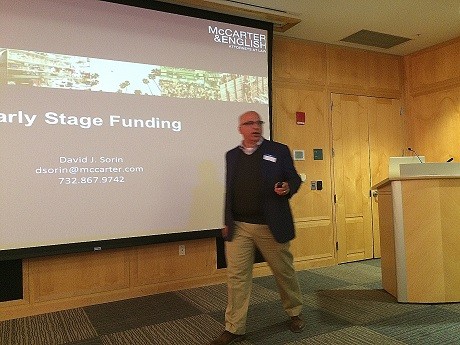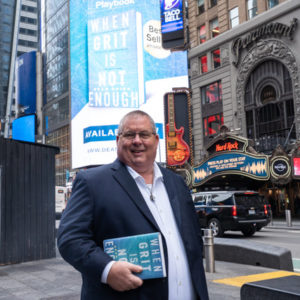At Princeton Tech Meetup, Sorin Discusses Startup Funding and Regulation A-Plus

At the Princeton Tech Meetup on April 22, David Sorin, Chair of the Venture Capital and Emerging Growth Company Practices at the law firm McCarter & English, gave a comprehensive overview of the funding mechanisms for emerging companies, and then answered many questions from the audience.
More than 100 attendees packed the room at the Princeton Public Library for the meeting. The Princeton Tech Meetup has expanded to nearly 3,400 members organizers Venu Moola and Chris Boraski said.
Sorin opened his talk by telling the meetup attendees that there was no question in his mind that meetings like this is where the future is. Tech and tech-enabled companies have always been the leaders of the economy, he said, and “you just have to be a student of history to understand that.”
He recounted some of his personal history, saying that when he graduated from college he became a Big Eight accountant. “I knew I was too young and too stupid to go law school at that point.” But after a few years, he did go to law school, and ended up on Wall Street representing large corporations. When Morgan Stanley created their high tech group, he asked to go to that unit. “That’s when my interest in technology companies was born.”
Sorin said he spent about seven years “primarily representing the money,” but he realized that he was an entrepreneur at heart, and should be representing entrepreneurs. He moved to an area near Princeton and was recruited by a large law firm. “By the year 2000, we had the second-largest technology company practice in the country.” By 2007, Sorin had had enough with the economics of big law firms, and became a law professor at Drexel Law.
“I watched as ’08 and’09 happened, and I was watching how the business community generally, and the legal community in particular, responded to what was going on in the world,” he said. Businesses and law firms made temporary changes, but Sorin saw lower capital intensity on the horizon. Deal size was going to shrink. And if deal size shrunk, the transaction costs associated with making those deals had to shrink as well. According to Sorin, entrepreneurs can now start companies on far less capital than before, and can get to commercialization and to positive cash flow and profitability with far less money than it took 10 or 15 years ago.
Sorin then built a law firm with far lower billing rates and more experienced people, “so that we could deliver a better solution at a lower cost. … Within two years, we were ranked the number one law firm in the country for tech and tech-enabled companies.” But like so many startups, “we had a problem,” Sorin admitted. The firm didn’t have enough IP (Intellectual Property) lawyers, executive compensation, tax lawyers and lawyers in other specialties. “McCarter & English understood our model, embraced it, and so we merged roughly seven months ago,” he explained.
Some of Sorin’s most pertinent remarks came towards the end of the evening, in reaction to the new Regulation A-plus crowdfunding rules that had just come out, allowing companies to raise up to $50 million from unaccredited investors.
The JOBS Act required the Security and Exchange Commission to update and expand Regulation A, so the SEC came out with Regulation A-plus. “I give it a B minus,” said Sorin. The reason: the objective of the rule change was to make raising money less expensive for entrepreneurs, and it has not accomplished this.
Under Regulation A-plus, you don’t have to be accredited to invest. But if you’re not accredited, there is a dollar limit. Sorin said that the SEC “felt like it has to protect widows and orphans from their own worst instincts,” so unaccredited investors have a limit on how much they can buy in an A-plus offering. On the positive side, investors can self-certify their income and net worth, general solicitations are now allowed, issuers can discuss their offerings using social media and the shares are freely tradable.
On the flip side, issuers have to provide a disclosure document approved by the SEC prior to the sale of their stock. “This takes all of the juice out of Regulation A-plus. It is expensive. It is subject to the same review as an IPO,” said Sorin. For offerings up to $20 million you don’t need an audit, but if you go to $50 million you need two years of financial audits. Offerings over $50 million get the benefit of state law preemption.
“But the very companies that this is really intended to benefit … the people who are doing smaller transactions, [have] no state law preemption.” If companies use social media to make their offers, they are actually making their offers in every state, “so this is really ugly,” he added. The SEC stated that it will adopt a coordinated system of review, but what that system will entail is still under consideration.
Sorin thinks that “the continued measures designed to protect investors from themselves and from unscrupulous issuers” are too great a drawback for these rules to effectively democratize investing. The drafting and reviewing process could “have a chilling effect” and convince issuers to stick with Regulation D, he told the group. Moreover, nobody knows if the coordinated review system is going to work.
At the beginning of the talk, Sorin discussed some early-stage funding methods like bootstrapping and friends and family.
The most important source for early-stage funding is bootstrapping, he said. “I hope you don’t empty your pockets starting your business. That’s not a smart thing to do. But we are going to dig into our own pockets when we start a business. … Prospective investors expect that you will be willing to invest in yourself in order for them to want to invest in you.”
After bootstrapping comes “friends, family and fools.” Sorin said he isn’t a big advocate of friend and family financing because of the emotional toll it takes on the founders, especially if the next funding round is a down round.
Accelerators are designed to turn startups into functional businesses, providing the founders with a little bit of seed capital, some space, mentors and advisors, according to Sorin. They are mainly for very early-stage entrepreneurs who have never started a business, he noted.
Angels and angel groups are usually more sophisticated investors who have “been there, done that.” They may be successful entrepreneurs who have expertise in a particular industry or technology, and want to help new entrepreneurs bring new ideas, products, services, and solutions to market. These investors can bring added value because of their knowledge.
Venture capital funds often have very specific ideas about the terms, board seats, liquidation preferences, redemption rights, antidilution protection and registration rights, “all of which are designed to give them some level of control over your company, usually in the form of veto powers,” Sorin said. “There’s been a move towards standardization [of term sheets], which is really good for you guys, because it means that these deals aren’t being reinvented every single time.”
Not all venture capital funds are created equal, Sorin said, but if you get the right one, it can provide extensive industry expertise and experience. “They can bring value because they know who your customers or clients may be, they know who your strategic partners may be.”
He recalled that 15 years ago the early-stage funding ecosystem in New Jersey was dead. “We had recently created the New Jersey Technology Council, which was really the first attempt at a state-wide organization to help support entrepreneurs. … But we had no indigenous early-stage venture fund.” A group of those who had founded the NJTC got together to create one. “That fund is now 15 years old, and I can tell you that it had its first two major exits in the last couple of weeks. So, those of us who invested in that fund are finally smiling after a 15 years of waiting,” he said.
Sorin reminded the group that there is another source of funding: corporate partners. “Do not ignore the possibility of corporate partners as a really critical source of money or resources or advice. … They’re an incredible stamp of credibility, if you will, because if an industry insider thinks what you are doing is great, investors are very often going to follow suit.”
The audio of David Sorin’s presentation can be found here: https://soundcloud.com/mathewpassy/dave-sorin-princeton-tech-meetup courtesy of Mathew Passy.

